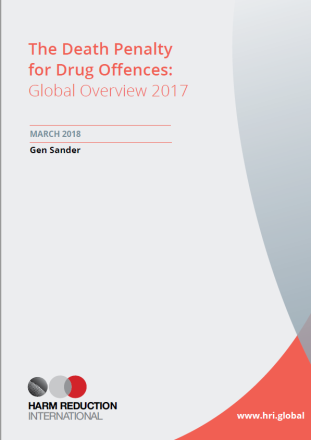
The Death Penalty for Drug Offences: Global Overview 2017
download full reportIntroduction
Harm Reduction International has monitored the use of the death penalty for drug offences worldwide since our first ground-breaking publication on this issue in 2007. This report, our seventh on the subject, continues our work of providing regular updates on legislative, policy and practical developments related to the use of capital punishment for drug offences, a practice which is a clear violation of international law.
Executive Summary
This is the tenth year that Harm Reduction International (HRI) has been working on the death penalty for drug offences and, regrettably, prohibitionist and punitive approaches to drugs continue to result in the execution of hundreds of people for non-violent drug offences every year. The majority of those sentenced to death and executed are low level couriers who often experience overlapping and intersecting forms of vulnerability, discrimination and exclusion and who are often subjected to forced confessions and unfair trials. Not only do these executions continue to fail to achieve any reduction in drug use and trafficking, they are also a clear violation of fundamental human rights under international law.
This report looks at the death penalty for drugs in law and practice.
It also considers critical developments on the issue. Some of its key
findings include:
- There are at least 33 countries and territories that prescribe the death
penalty for drug offences in law. - At least nine countries still have the death penalty for drug offences
as a mandatory sanction, although three of these (Brunei Darussalam,
Laos and Myanmar) are abolitionist in practice. Malaysia removed the
mandatory sentence for drug offences in November 2017. - Between January 2015 and December 2017, at least 1,320 people are
known to have been executed for drug-related offences – 718 in 2015;
325 in 2016; and 280 in 2017. These estimates do not include China,
as reliable figures continue to be unavailable for the country. - Taking China out of the equation due to a lack of data, Iran has been
the world’s top executioner for drug offences by far, with at least
1,176 executions carried out since January 2015. That amounts to
nearly 90% of all reported drug-related executions during that period. - Between 2015 and 2017, executions for drug offences took place in at
least five countries: China, Iran, Saudi Arabia, Indonesia and Singapore.
The number of States that retain the death penalty for drug offences in their legislation has not declined since HRI last reported in 2015, and the same ‘extreme fringe’ of the international community – namely China, Iran and Saudi Arabia – continue to aggressively pursue the penalty in drug cases. That said, while 2015 saw a huge spike in executions for drug-related offences in Iran, Saudi Arabia and Indonesia, numbers in these countries have since declined and important policy developments have recently taken place in some countries. Thailand, for example, adopted legislative amendments to its Narcotics Law in January 2017 that introduced reductions in penalties for possession, import/ export and production for the sale of drugs, and abolished the mandatory death penalty for the offence of selling drugs.1 In Iran, an amendment to the Anti-Narcotics Law approved in October 2017 raised the minimum quantity of drugs required to incur capital
punishment, with the change applied retroactively to prisoners on death row.
Meanwhile, Malaysia removed the mandatory death sentence for drug offences in November 2017.3 As further demonstrated throughout the Country Overview section, there are indications that the tide could be shifting at the national level.
This is certainly the case at the international level, where political support for the abolition of the death penalty for drug offences is intensifying. The 2016 UN General Assembly Special Session (UNGASS) on the World Drug Problem was the centre of debate on the issue, with 73 States strongly voicing their opposition to the practice. While the final outcome document failed to include any language on the death penalty, it made important strides with regard to human rights and proportionate sentencing more generally, and placed the abolition of the death penalty for drug offences firmly on the radar of the global community.
Yet, alongside these promising developments, the period 2015 to 2017 has also seen the birth of the brutal ‘war on drugs’ in the Philippines, which has resulted in an estimated 12,000 extrajudicial executions.4 Considering these very worrying developments, this report also includes a section on the rise of extrajudicial executions for drugs, which looks at the impact it is having both in the region and more broadly, as well as its implications for the judicial application of the death penalty for drug offences
Don't miss our events and publications
Subscribe to our newsletter